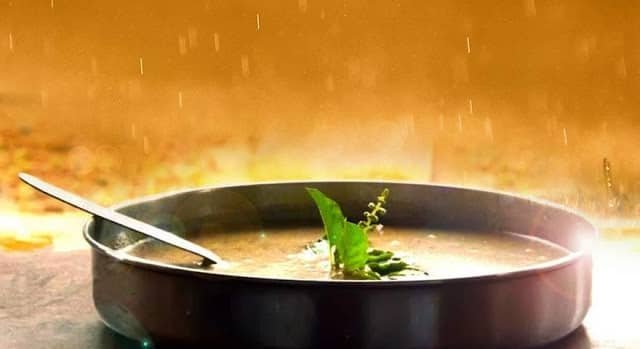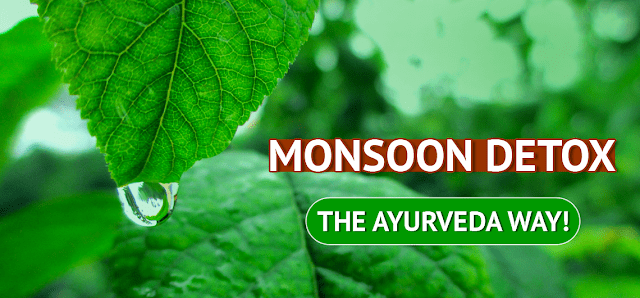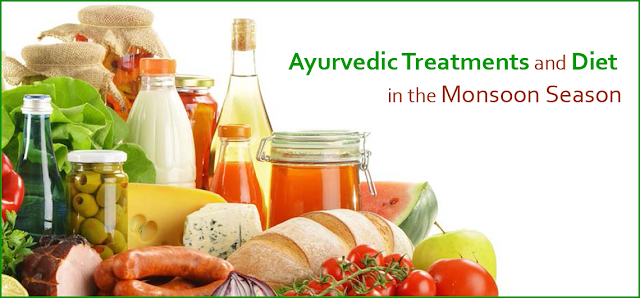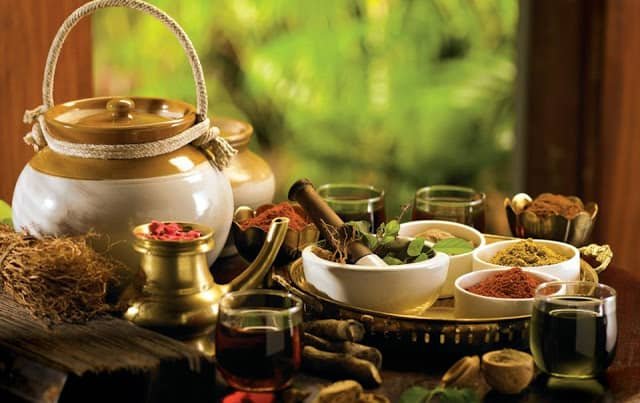Ayurveda lays emphasis on prevention of diseases rather than to cure them. Based on the analytical reasoning, Ayurveda recommends different regimens of diet and lifestyle for different seasons to ward off the imbalances in the body and thereby helps in boosting immunity and maintaining good health. This concept of following a specific diet and lifestyle modification in a specific season to prevent various diseases is described as Ritucharya.
Monsoon season is categorized as Varsha Ritu in Ayurvedic texts. It ranges from the month of Shravana toBhadrapada (Mid July to Mid September) and denotes the onset of Visarga Kala or Dakshinayana or Southern Solstice. During this season, the sky is covered by clouds and rains occur without the thunderstorm. The ponds, rivers, etc are filled with water.
Ayurveda describes the aggravation of Vata and accumulation of Pitta in Varsha Ritu. Constant raining, moisture in the atmosphere and cold weather results in aggravation of Vata which was accumulated during the dry and dehydrating heat of the summer; while Pitta accumulates following the conducive acidic conditions of the atmosphere as the predominant Rasa is Amla (sour) and Prithvi and Agni are predominant Mahabhutas in the rainy season.
According to Ayurveda, Agni is responsible for the digestive & metabolic activities of the body. During monsoon, the digestive fire or Agni weakens, leaving digestive system most vulnerable to various ailments. Diet thus followed during this season should balance the vitiated doshas and stimulate Agni to perform proper digestion.
Monsoon is the time when body’s immunity drops, thus proper care should be taken to prevent possible illnesses like general debility, blood and skin related problems, pain and swelling of joints, ringworm, fever, malaria, dysentery etc. In addition, other virus and bacteria related diseases may also emerge.
Here are few simple guidelines recommended by Ayurveda that should be followed during the monsoon season. By following these dos and don’ts, you’ll be able to celebrate the monsoons without fearing its adverse impact –
ü One of the foremost rules in monsoon in Ayurveda is to eat according to the ability of one’s digestion. One must use spices such as pepper, ginger, asafoetida (Hing), garlic, cumin powder, coriander and turmeric for enhancing digestive capability. A small piece of ginger with rock salt before every meal is highly recommended. These help in improving immunity too.
ü Consume warm, light and fresh foods prepared from barley, rice, wheat, gram flour, corn or oats. Brown rice and bread are the best food items to go with during monsoons.
ü Avoidance of curds, red meat and any foodstuff, which takes longer time to digest, is good during the monsoon. One may have buttermilk instead of curds. Include cow’s ghee in daily diet to kindle the digestive fire.
ü Consumption of uncooked / raw leafy vegetables and salads should be avoided. You may consume their sour and salted soups instead. However, if you want to have them raw, they should be washed thoroughlyto ensure removal of bacteria and dirt before eating. The leafy vegetables contain larvae too and you need to be very careful in finding them while washing. The vegetables recommended in this season include yam (Suran), snake gourd (Turi), pointed gourd (Parwal), bitter gourd (Karela), cluster beans (Gavaar), apple gourd (Tinda), pumpkin, brinjal, bottle gourd and garlic etc.
ü Drinking boiled water with a dash of honey, or sipping on hot and herbal tea is ideal for this season. Drink small portions of lukewarm water throughout the day for good digestion. Pure water should be taken. If the water is taken from well, pond or river, then alum should be applied before using it. Water should be consumed within 24 hours of boiling. Avoid drinking excess fluids at this time as this further slows down the metabolism.
ü Among fruits, stick to pomegranates, mangoes, bananas, apples, lychees and cherries. Stick to seasonal fruits during monsoons as the unseasonal ones can easily get infected with microbes and worms during the monsoons.
ü Avoid non-vegetarian foods in monsoon. The possibility of germ content is highest in non-vegetarian foods.Those who can’t should go for lighter meat preparations like soups and stews rather than heavy curries.
ü Increased intake of sweet, sour and salty food is recommended while excessive pungent, bitter and astringent tastes should be avoided. Food, which contains acid, salt and greasiness, should be taken.
ü Although it is difficult to resist snacks in the cool weather, your diet should mostly consist of cereals and vegetables cooked in minimum of oil. If you want to snack, there is no dearth of healthy options. In rainy season, prefer grilled items such as bhutta (corn), chana (black gram), etc as humidity is very high and these food items are relaxing to the system and will not lead to accumulation of doshas. Having oily food would create problems in digestion.
ü Eat food cooked at home always. Excellent road side temptations like pani puri and bhel puri are not prepared hygienically and thus may cause stomach aches. So it would be better to control yourself till the end of the season so as to keep yourself healthy and fit to enjoy the monsoons to the fullest.
Avoid eatingchaats, fried items such as pakoras, pre-cut fruits and juices from roadside vendors
Avoid foods such as pasta, soups, and other such foods which are meant to be good host for the growth of bacteria. Avoid fermented foods which include idli, dosa, uttapam, etc. People tend to eat a lot of junk and fried food during the rainy season. This can lead to weight gain and lethargy.
ü Excessively spicy foods such as tamarind and pickles should be avoided. They add taste to your food but can be very heavy in the monsoon.
ü Don’t consume food which is stored in cold storage or a refrigerator.
ü Fasting is especially recommended in the monsoon season, particularly for people fond of erratic eating. You can gain a lot of health benefits simply by observing a weekly or fortnightly fast during monsoon. It helps to improve your digestive fire.
LIFESTYLE MODIFICATIONS
Consumption of healthy diet only may not provide desired results unless supported by lifestyle modifications. Following are the tips for important changes in lifestyle of rainy season –
ü Avoiding daytime sleep is good as it hampers digestion and slows down the metabolism. Similarly, waking during night too is a bad thing to do as it further vitiates an already aggravated Vata.
ü Over exertion or over work will lower your metabolic rate and hence must be avoided. Perform only moderate exercises such as light walks and simple yogasanas. Do not tire yourself.
ü Keep the surrounding dry and clean and do not allow water to stagnate at places near you as it offers mosquito, flies and many microorganisms which may cause many diseases like malaria, typhoid, common cold, conjunctivitis, cholera and a variety of skin diseases.
ü Avoid getting wet in the rains. Always carry an umbrella. However, if it happens, it is better to take a bath with clean water and change into dry clothes as soon as possible in order to avoid exposure from infections as immunity is naturally low during monsoon. Keep body warm, to protect any attack from viruses as and when body temperature goes down.
ü Dampness breeds fungal and bacterial infections. Hence home as well as workplace should be damp free.
ü Oil massage followed by a warm water bath regularly is recommended.
ü Fumigation with likes of loban and dry neem leaves for drying cloths and killing insects / bacteria is recommended.
ü Use of Perfumes is advocated in this season.
PANCHAKARMA

Varsha Ritu or Monsoon season is considered as the best to go through Ayurvedic treatments since the moist climate opens up the pores in the skin, making it more receptive to all the medications and treatments. Ayurvedic treatments are highly recommended during this season in order to prevent any kind of disorders and to boost immunity.
Here are few key benefits of Ayurveda during the Monsoon season

Balances the vitiated doshas
Increases immunity
Cleanses & detoxifies the body
Rejuvenates body & mind
Prevents lifestyle disorders like diabetes, blood pressure & stress
Conclusion
In this season, more especially, people of vataja prakriti and likewise people suffering from vataja disorders like arthritis (rheumatoid as well as osteoarthritis), backache, lumbar and cervical spondylosis, insomnia, swelling in joints, sciatica, body aches etc are major sufferers. They must consult an Ayurvedic consultant so as to avoid a Vata imbalance.
If the above-mentioned diet and lifestyle is followed during the Monsoon, one can do their best to balance the body and mind.
With Regards,
Dr V D Singh MD (Ay)
Ayurcare, Vijaypur (Jammu)
Mobile : +91- 9419180272 | +91- 9622361874








